El 'argenchino' se enamora de SZ 华裔阿根廷小伙的深圳情
Si por casualidad te topas con un joven con cara china por la calle de Shenzhen y cuando hablas con él, tiene un acento un poco exótico, una mezcla de acento de Beijing y de otro planeta, ese es el "CHE" David Fernando Li, un argentino de padres chinos.
If you bump into a young man with a Chinese face on the street of Shenzhen and when you talk with him, he has an exotic accent, with a bit of a Beijing tone and something from another planet, this guy is David Fernando Li, an Argentinian with Chinese parents.
如果你在深圳的大街上碰见一个长着中国面孔的小伙子,他说话带点京腔,还有点异域口音,不要惊讶,这个小伙是大卫•费尔南多•李,一个华裔阿根廷人。

David Fernando Li (L) with some friends in Xalapa restaurant in Nanshan District in this undated photo. Photos courtesy of the interviewee except otherwise stated.
El "argenchino," como le gusta que le llamen, es uno de los socios de Xalapa, un restaurante de estilo mexicano y argentino que está ubicado en el distrito de Nanshan. También es el director para Shenzhen de la Asociación de Argentinos en China (Adeach). Nació y creció en Argentina, el joven de 31 años, vino a Shenzhen en 2016 por cómo se vive y las oportunidades que genera esta gran ciudad para los jóvenes emprendedores.
The "argenchino," which he enjoys being called, is one of the partners of Xalapa, a restaurant blending Mexican and Argentinean styles located in Nanshan District. He is also the director for the Shenzhen branch of the Association of Argentinians in China (Adeach). The 31-year-old young man, who was born and grew up in Argentina, came to Shenzhen in 2016 for the living style here and the opportunities this great city has to offer for young entrepreneurs.
大卫喜欢别人叫他“argenchino”,他是Xalapa墨西哥餐厅的合伙人之一。这家位于南山的餐厅经营墨西哥和阿根廷美食。此外,他还是在华阿根廷协会深圳分会的会长。这个在阿根廷出生长大的31岁小伙于2016年来深,因为他喜欢这里的生活方式,以及这座伟大城市给年轻创业者提供的机会。
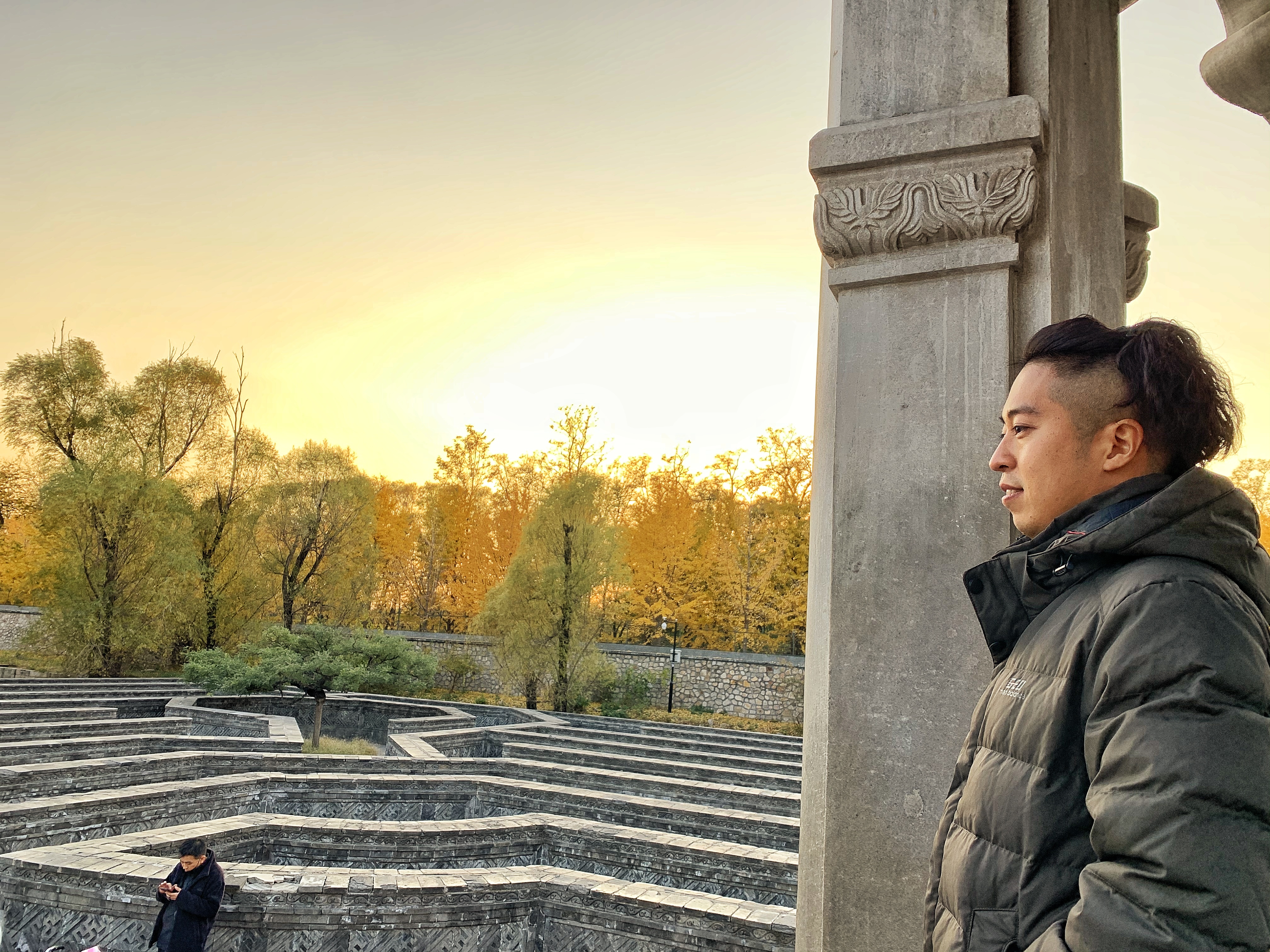
David Li at Yuanmingyuan, or the Old Summer Palace, in Beijing in November 2020. Chen Xiaochun
"Se acostumbra a tener dos nombres en Argentina, por eso me llamo David Fernando y mi apellido es Li, por mi ascendencia china. Mis padres llegaron a Argentina en el año 1987. Estuvieron dos años en Capital Federal y después se mudaron a la Provincia de Buenos Aires," contó Li.
"In Argentina, people are used to having two parts in their first name, so my first name is David Fernando. My family name is Li because my parents were from China. My parents arrived in Argentina in 1987. They stayed in the Federal District for two years and later moved to Buenos Aires Province," said Li.
“在阿根廷,名字一般由两部分组成,我的名字叫大卫•费尔南多,我姓李,因为我父母是中国人。他们在1987年的时候去到阿根廷,在Capital Federal待了两年,后来搬去了布宜诺斯艾利斯省。” 大卫跟英文《深圳日报》说道。
Su infancia y adolescencia la pasó en la ciudad de San Martín. La recuerda muy divertida y llena de emociones. "Como siempre digo en Argentina nunca te podés aburrir," dijo Li. También hizo la primaria y la secundaria en la misma ciudad.
He spent his childhood and adolescence in the city of San Martín, which was full of fun for him. "Like what I always say, in Argentina you never get bored," said Li. He also went to primary and secondary schools in the same city.
大卫的童年和青少年时期是在布宜诺斯艾利斯省圣马丁市度过的。在他的记忆中,那段日子充满各种乐趣。“就像我经常说的,在阿根廷你永远不会感到无聊。”大卫说道。他的小学和中学都是在圣马丁市上的。
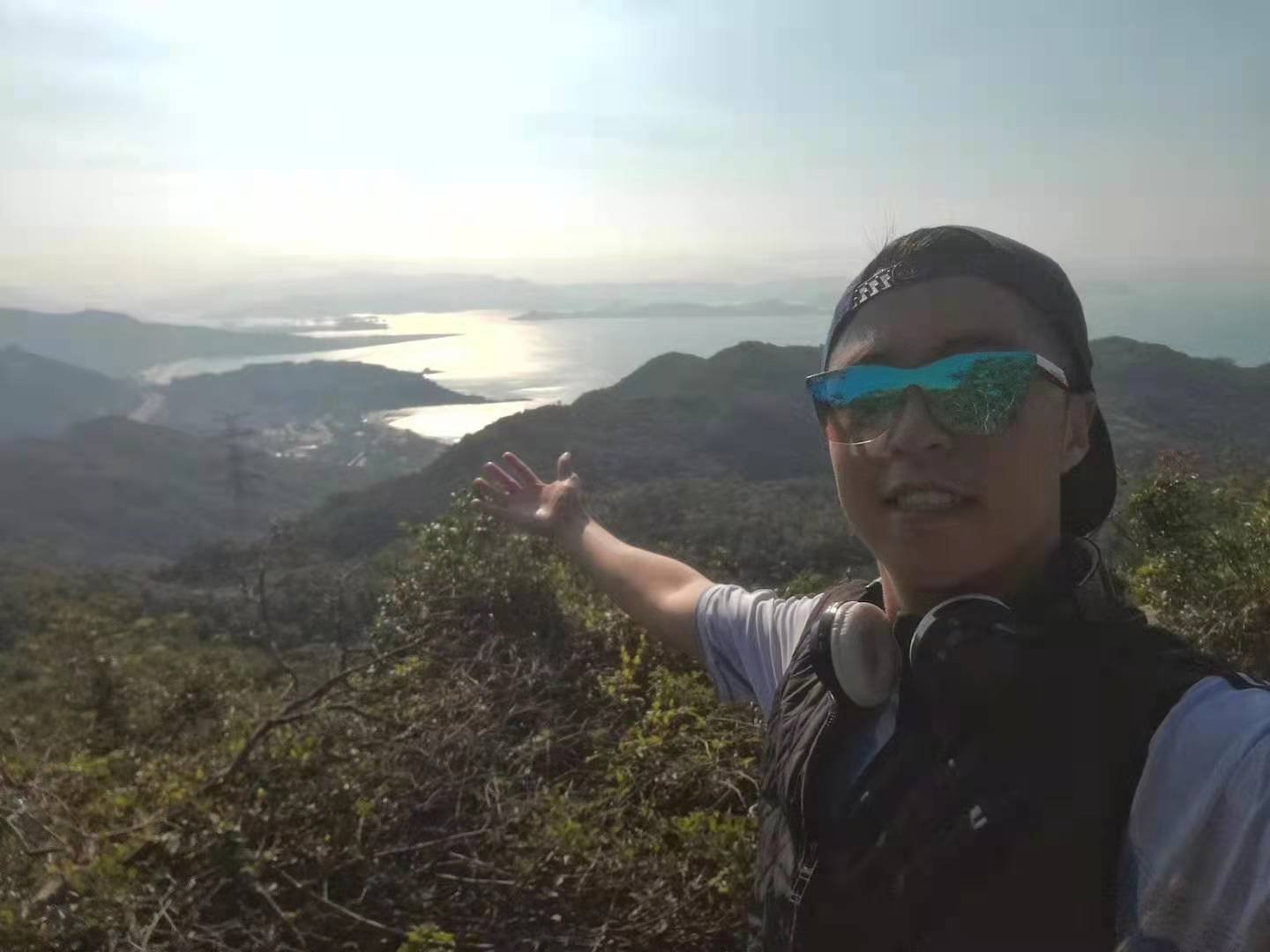
Li on a mountain near Xiaomeisha in Yantian District in this undated photo.
El 2014 fue un año muy difícil para la familia de Li. Su padre tuvo un problema de salud y de repente falleció. Para cuidar más a su madre, Li dejó la universidad. "Estábamos planeando a ver qué hacer de la vida, y mi madre me dijo lo de venir a China," contó Li.
The year 2014 was difficult for Li's family. His father had a health problem and suddenly passed away. To take care of his mother, Li dropped out of university. "We were wondering what to do with our life, and my mom told me about coming to China," said Li.
2014年对大卫的家庭来说是非常困难的一年。他父亲身体不好,突然离世。为了更好地照顾他母亲,大卫从大学辍学。“当时我们在想接下去怎么生活,然后我妈妈提议回中国。”大卫说道。
Al año siguiente, después de arreglar los asuntos en Argentina, decidieron emprender la aventura hacia el lejano oriente. Llegaron a China a mitad de 2015 y la primera parada fue Beijing, que es de donde la familia de Li es originaria. Allí conoció a su actual socio Esteban, también argentino. En ese mismo año fundaron, junto con otros argentinos, la Adeach. El objetivo principal de ésta es ayudar y asistir a todos los argentinos que residen en China.
In the following year, after arranging everything in Argentina, they decided to embark on the adventure to the Far East. The mother and son arrived in China in mid-2015 and the first stop was Beijing, where Li's family is originally from. There he met his current partner Esteban, who is also Argentinian. In the same year, together with other Argentineans, they founded Adeach. The main objective of Adeach is to help all Argentinians living in China.
第二年,在安顿好阿根廷那边的事情后,他们母子开启了远东之旅。2015年年中,他们抵达中国,第一站是北京,这也是大卫父母的家乡。在那里,他遇到了现在的合伙人埃斯特班,也是阿根廷人。同年,他们与其他阿根廷人一起成立了在华阿根廷协会。该协会的主要目标是帮助在中国生活的阿根廷人。
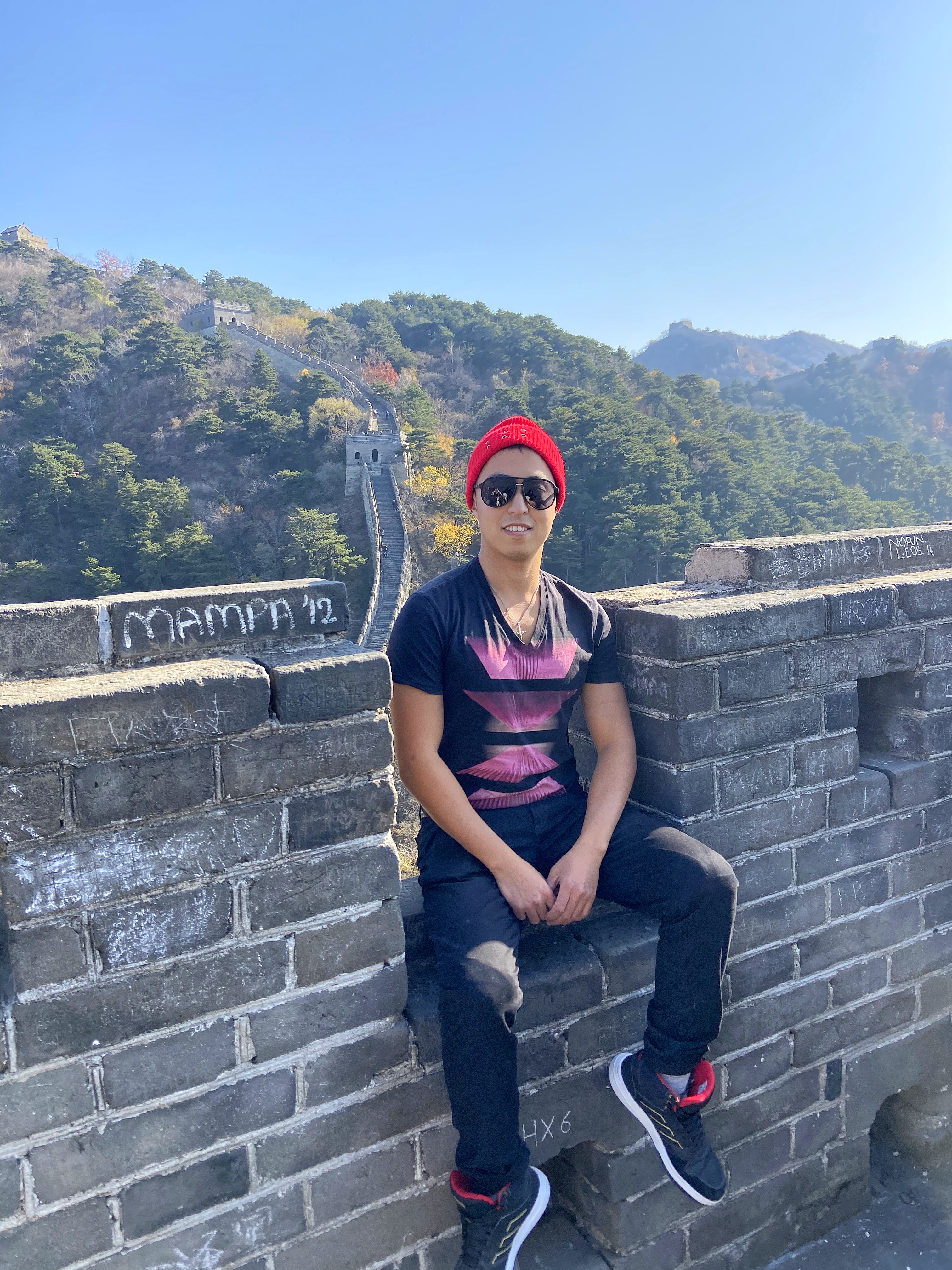
Li on the Great Wall in Beijing in November 2020. Luo Minting
Para Li adaptarse en China fue difícil, como cualquier otro extranjero, pero con la ventaja considerable de saber hablar chino. En Pekín tuvo pocas posibilidades de desarrollo y se vio en la gran duda de por dónde comenzar. Después en 2016 le llegó la oportunidad de ir a probar a Shenzhen. En ese momento, su socio, quien le ofreció esa oportunidad, le dijo: "David, nos vamos para Shenzhen. Primero vemos la situación de allá, y si te gusta, nos quedamos. Si no te gusta, bueno, no importa. Nos vamos a otro lado."
Like any other foreigner, it was difficult for Li to adapt to the life in China, but he had the advantage of speaking some Chinese. He spent one year in Beijing, where he found few opportunities and was wondering where to start. Then in 2016, an opportunity of development in Shenzhen knocked at his door: At that time, his current partner told him: "David, we are going to Shenzhen. First we'll see the situation there, and if you like it, we'll stay. If you don't like it, well, it doesn't matter. We can go somewhere else."
跟其他外籍人士一样,大卫适应中国的生活有一定的难度,但他有一个优势,就是能说些中文。在北京,他没有发现合适的发展机会,在考虑从何下手。2016年,一个到深圳发展的机会出现在他面前。当时,埃斯特班跟他说:“大卫,我们去深圳吧。我们先去看看那里的情况,如果你喜欢,我们就留下来。如果你不喜欢,没关系,我们可以去别的地方。”
Sin dudarlo se fueron rumbo para el sur de China. "Al principio estuve un mes viviendo en un hotel. La verdad, estaba bastante bien, me gustaba mucho y allí engordé como 10 kilos, porque en el hotel había un desayuno buffet todos los días y comía como si tuviera dos estómagos. Comí un montón. Es el momento cuando estaba más gordo, pesaba 73 kilos," dijo Li sonriendo.
Without hesitation they left for South China. "At first I spent a month staying in a hotel and it was pretty good. I liked it a lot and I gained 10 kilos in weight, because in the hotel there was a buffet breakfast every day and I ate as if I had two stomachs. I ate a lot. That's the time when I was the fattest, I weighed 73 kilos," Li laughed.
于是,他们出发前往华南地区。“最开始的一个月我一直住在酒店。那里相当不错,我非常喜欢,我在那里胖了大约10公斤,因为酒店每天都有自助早餐,我吃很多,好像我有两个胃一样。那是我最胖的时候,我的体重达到了73公斤。”大卫笑着说道。
Muy pronto Li se enamoró de esta ciudad tan joven, limpia y llena de oportunidades.
Pretty soon David fell in love with this young, clean city full of opportunities.
大卫很快就爱上了这座年轻、干净和充满机会的城市。
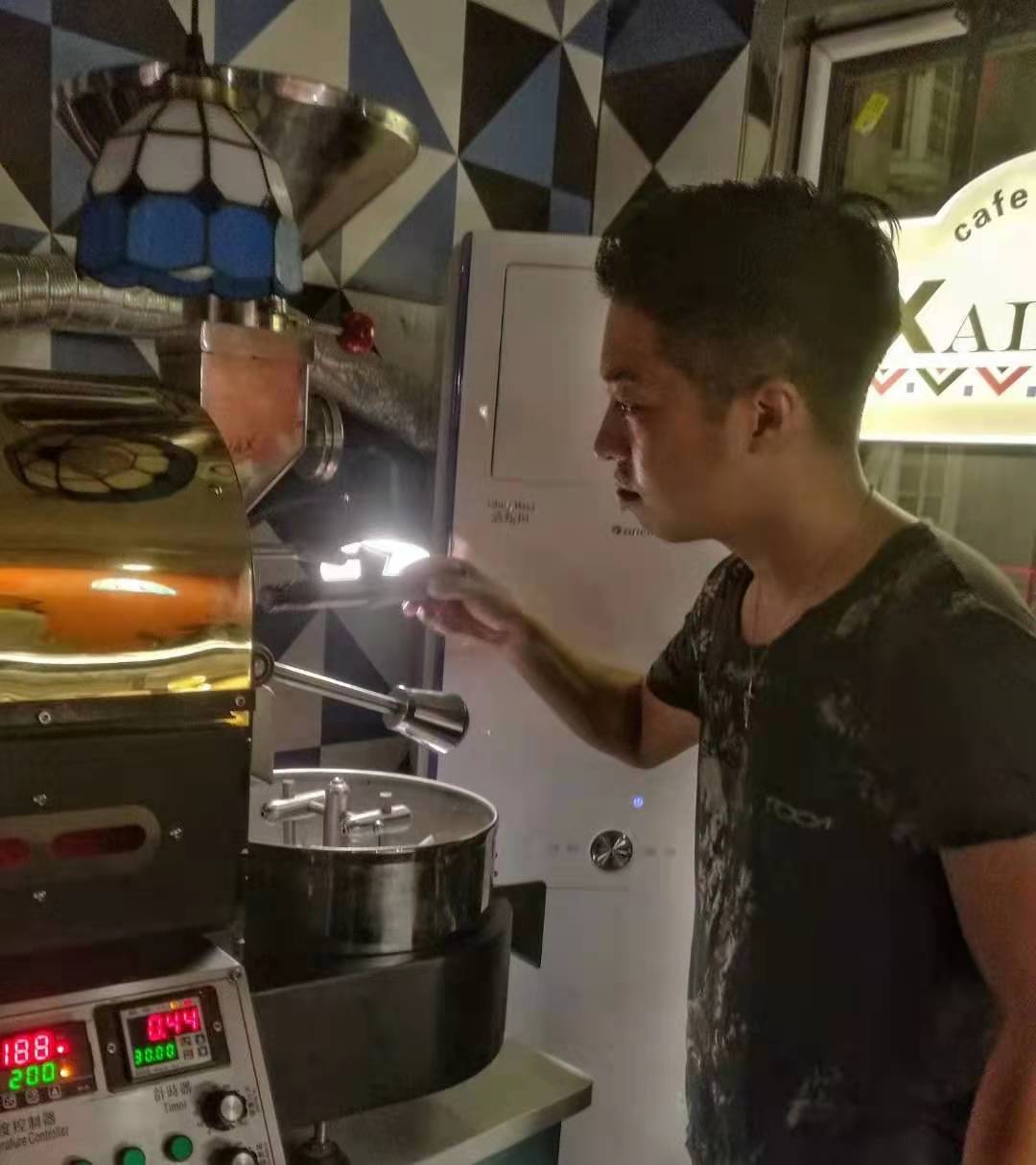
Li prepares food in his restaurant.
"Me encantó Shenzhen en todos los sentidos, clima, gente, comida... y obviamente el aire puro y limpio. Me encantó y dije que este era mi lugar. Cuando volví a Beijing, agarré mis cosas y en una semana ya estaba listo para mudarme, y dije a mi madre: 'Mamá, me voy a Shenzhen. Yo tengo una gran oportunidad en esa ciudad y no la voy a desperdiciar, porque las oportunidades se ven una vez y si no las agarras, se van,'" recordó el joven.
"I loved Shenzhen in every way, its weather, people, food … and of course its clean, pure air. I loved it and said this was my place. When I got back to Beijing, I grabbed my stuff and within a week I was ready to move, and I said to my mother, 'Mom, I'm going to Shenzhen. I have a great opportunity in that city and I'm not going to waste it, because opportunities come once and if you don't grab them, they're gone,'" the young man recalled.
“我喜欢深圳的方方面面,这里的天气、人、食物......当然还有那干净新鲜的空气。我很喜欢深圳,当时就觉得这是属于我的地方。然后我回到北京,在那里待了一周,收拾好我的东西,告诉我母亲说:‘妈妈,我要去深圳。我在那里有一个很好的机会,我不能错过它,因为机会只有一次,如果你不抓住它,它就会消失。’”这位年轻人回忆说。
Desde ese momento vive en Shenzhen y nunca más se alejó. En 2017 se dedicó 100% a Xalapa para que estuviera estable, que tuviera buen equipo de personas y que tuviera ganancia. "Porque tener un restaurante es difícil. Si no tenés experiencia, tenés que invertir mucho tiempo en el restaurante y conocer todas las áreas del restaurante para que no te vaya mal," dijo Li.
Since then, he has been living in Shenzhen and has never left. In 2017 he dedicated himself 100 percent to Xalapa to make sure that the restaurant will be stable, have a good team of people and make profit. "Running a restaurant is difficult. If you don't have experience, you have to invest a lot of time in the restaurant and get to know everything of it to make sure things don't go wrong," Li said.
从那时起,这个华裔阿根廷小伙就一直生活在深圳,从未离开。2017年,大卫把精力完全集中在运营Xalapa墨西哥餐厅上,让餐厅拥有一个好的团队,生意稳定下来且盈利。“因为经营一家餐馆很困难。如果你没有经验,你必须在餐厅投入大量时间精力,了解餐厅的所有领域,这样才不会出错。”大卫说道。
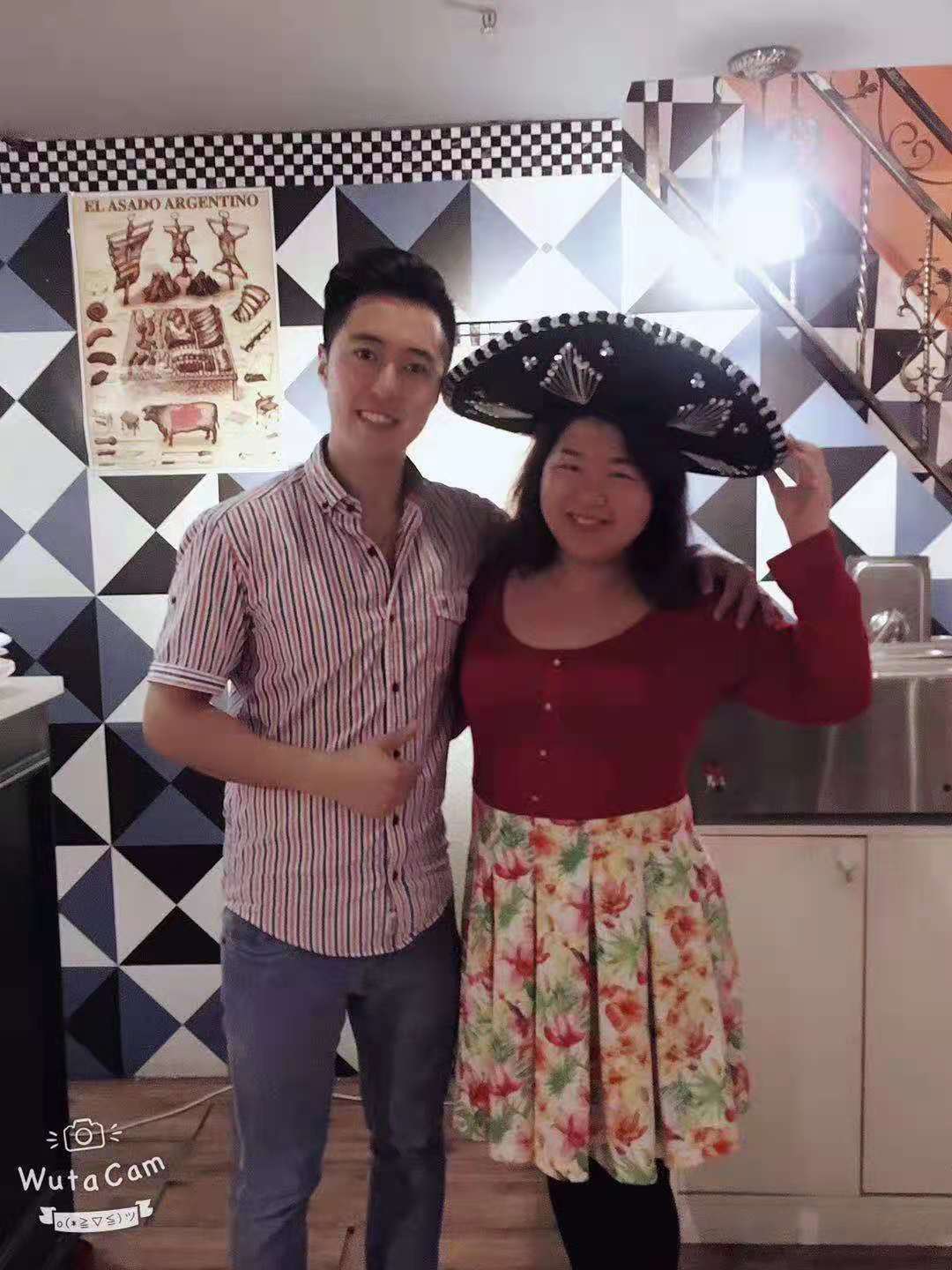
Li with a friend in his restaurant.
Después cuando el negocio del restaurante estaba estable y todo iba bien, Li invirtió más tiempo en el comercio exterior. Empezó a comercializar café mexicano y carne de res de Argentina. Todo iba bien hasta que empezó la pandemia y tuvo que parar un tiempo hasta que las condiciones para el comercio internacional mejoren.
Later when the business of the restaurant got on the right track and everything ran well, Li started to set foot in foreign trade. He started trading Mexican coffee and Argentine beef to China. Everything was going well until the pandemic struck. He has to stop for a while until the conditions for international trade improve.
在餐厅生意稳定下来后,大卫开始涉足外贸,他先后进口墨西哥咖啡和阿根廷牛肉到中国。一切都很顺利,直到新冠疫情席卷全球。由于疫情影响,他暂时停止了进出口贸易,等待国际贸易环境缓和。
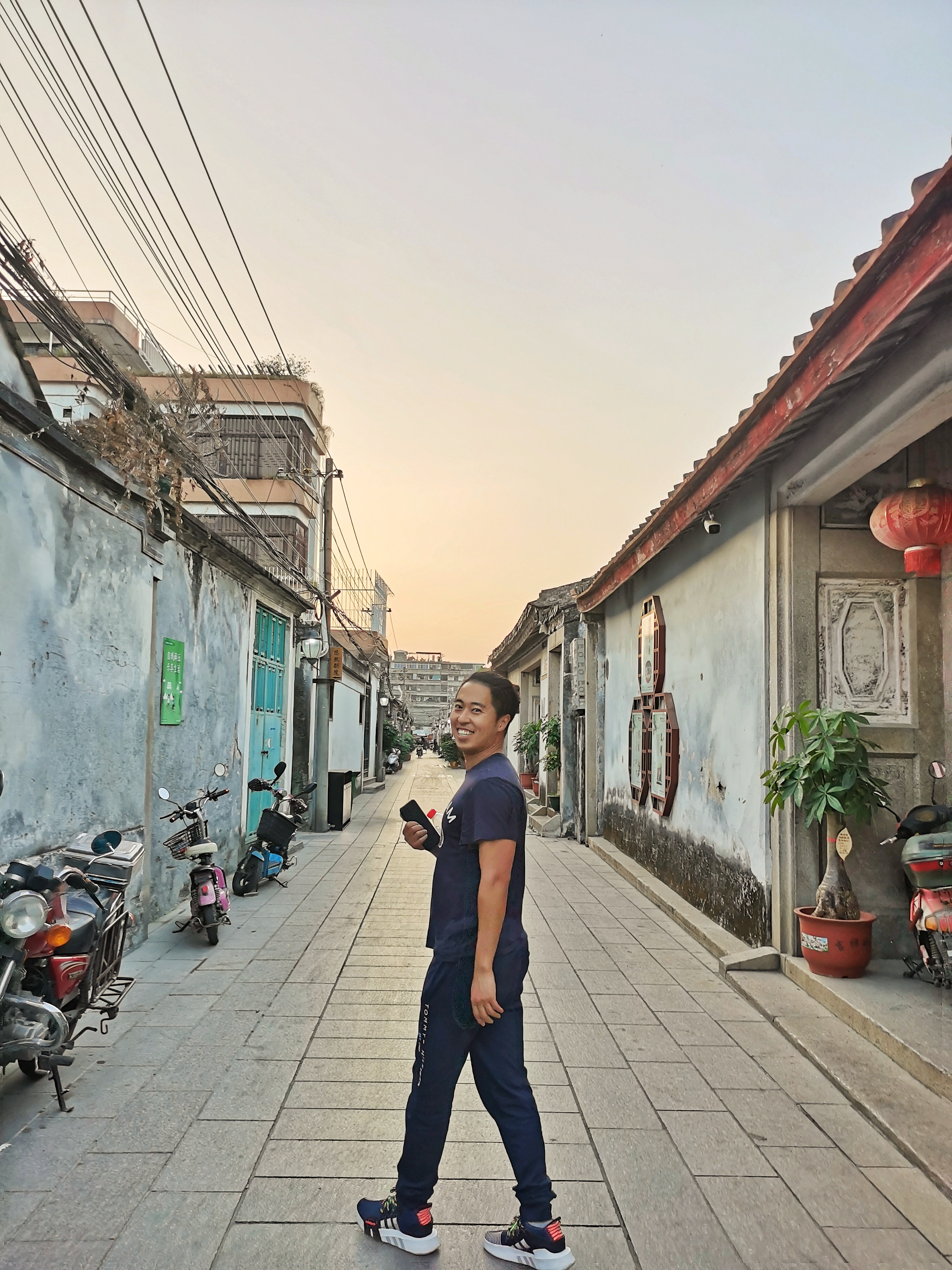
Li at an alley among the traditional folk houses in Chaozhou in 2020.
El primer idioma que aprendió Li fue el chino, ya que lo hablaba con sus padres, pero solo palabras sencillas. Cuando llegó a China se dio cuenta que su idioma chino era muy pobre y que tenía que mejorarlo, con el día a día fue mejorando y ahora tiene un chino bastante aceptable en la parte oral, pero no sabe ni leer ni escribir, que es la parte más difícil de esta lengua. Y como tiene una cara china, a él siempre le pasan muchas cosas graciosas en China, como esta anécdota que recuerda:
The first language that Li learned was Chinese, since he spoke it with his parents, but only simple words. When he arrived in China, he realized that his Chinese was very poor and needed to improve. With passing time, he has improved and now speaks well enough for daily communication, but he can neither read nor write, which is the most difficult part of the language. And since he has a Chinese face, funny things always happen to him in China such as the following anecdote that he remembers:
大卫学会的第一门语言是中文,因为他父母跟他说中文,但只是简单的生活词汇。来到中国时,他意识到自己的中文水平非常低,需要努力提高。经过一段时间的努力,大卫的中文口语提高了很多,但他还是不会读写,而这恰是中文最难的部分。由于他长着一张中国脸,在他身上发生了很多趣事,比如以下这个小故事:

Li in Xiaomeisha.
"Mi amigo, que es argentino y está en China desde hace más de 15 años, hizo un doctorado en comercio internacional en la Universidad de Renmin. Escribe y lee chino, es muy inteligente. Una vez estábamos en el metro de Beijing, e íbamos para la estación llamado 'Guomao.' Estábamos viendo el cartel del metro, y mi amigo me dijo: 'Mira, allí dice Guomao, ni kan yi xia (míralo), Guomao.' Después pasó un hombre, y nos miró, y dijo: 'Un extranjero le enseña chino a un chino? Esto es bien raro.' Entonces nosotros dos nos empezamos a reír. Era muy gracioso. Yo tengo la cara china pero el Laowai me estaba enseñando chino jajaja," contó Li riendo.
"My friend, who is Argentinian and has been in China for more than 15 years, did a Ph.D. in international trade at Renmin University of China. He writes and reads Chinese. He is very smart. Once we were in the Beijing subway, and we were going to the station called 'Guomao.' We were looking at the subway sign, and my friend said to me, 'Look, it says Guomao, ni kan yi xia (look at it), Guomao.' Then a man passed by. He looked at us, and he said, 'A foreigner teaches Chinese to a Chinese? This is very strange.' Then the two of us started laughing. It was very funny. I have a Chinese face but the Laowai was teaching me Chinese hahaha," Li laughed.
“我的合伙人是阿根廷人,在中国呆了15年,他在人民大学读了国际贸易博士,非常聪明,能读写中文。有一次,我们在北京地铁里,要去一个叫‘国贸’的地铁站。我们当时在看标识牌,他对我说,‘看,那里写着国贸,你看一下,国贸。’然后有一个中国人经过,他看着我们说:‘一个老外教一个中国人中文?这个太奇怪了。’然后我们两个人开始大笑。这非常有趣。我有一张中国脸,但老外在教我中文,哈哈哈。”李笑着说道。
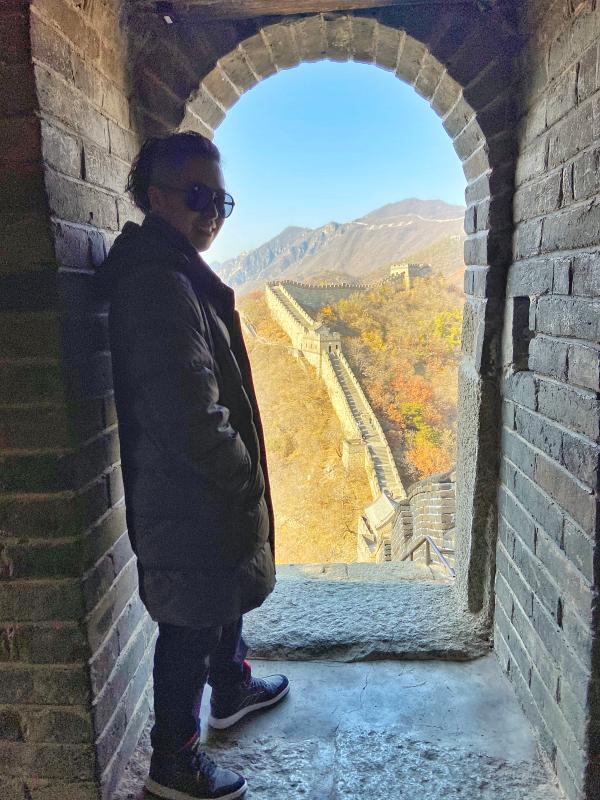
Li on the Great Wall in Beijing in November 2020. Luo Minting
El "argenchino" disfruta mucho en Shenzhen. "Si estás en Shenzhen, la disfrutas mucho porque aparte de hacer negocios, disfrutas de la vida. En Shenzhen hay muy lindas playas. A mí me encantan las playas. Los argentinos no podemos vivir sin ellas. Y la comida, la juventud,... está muy presente la juventud. Me gusta la ciudad joven y dinámica. Aparte tengo muchos amigos acá," dijo Li.
The "argenchino" enjoys Shenzhen a lot. "If you are in Shenzhen, you enjoy it a lot because apart from doing business, you enjoy the life here. In Shenzhen there are many beautiful beaches. I love beaches. We Argentineans cannot live without the beach. And the food here, the young people, … young people are everywhere. I like this young and dynamic city. And I have a lot of friends here," Li said.
这位华裔阿根廷小伙很享受深圳的生活。“如果你在深圳,你会非常享受这里,因为这里除了可以做生意,你还可以享受生活。深圳有很多美丽的沙滩,我非常喜欢沙滩,阿根廷人不能没有沙滩。还有这里的食物、这里的年轻人......深圳是一座年轻、充满活力的城市。此外,我在这里还有很多朋友。”大卫说。
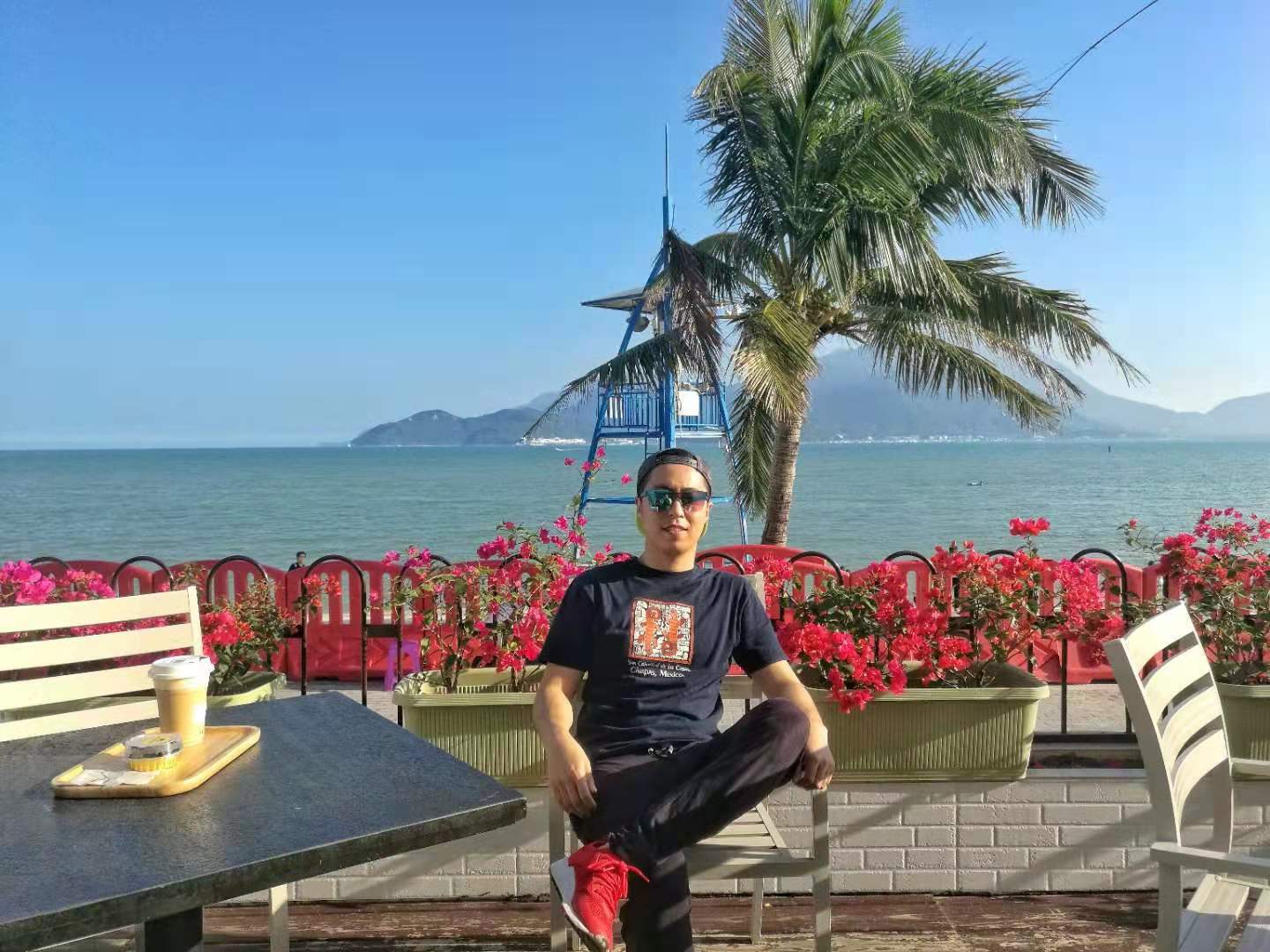
David Fernando Li in Jiaochangwei in this undated photo.
Según Li, la Asociación de Argentinos en China tiene más de 250 miembros registrados, pero ahora por razón de la pandemia, solo la mitad queda aquí en China. "En Shenzhen somos unos 15 argentinos. La mayoría son empleados de grandes empresas, también hay empresarios, estudiantes, freelancers, etc. Hay de todo un poco," introdujo Li.
According to Li, the Association of Argentineans in China has more than 250 members, but for now due to the pandemic, only half of them are in China. "In Shenzhen we have about 15 Argentineans. The majority of them are employees of big companies, but there are also entrepreneurs, students, freelancers, etc." Li explained.
大卫介绍说,在华阿根廷协会有250多名注册会员,但由于新冠疫情,现在只有一半在中国。“在深圳,大约有15名阿根廷人。他们中大多数是大公司的员工,但也有企业家、学生、自由职业者等。”大卫说。